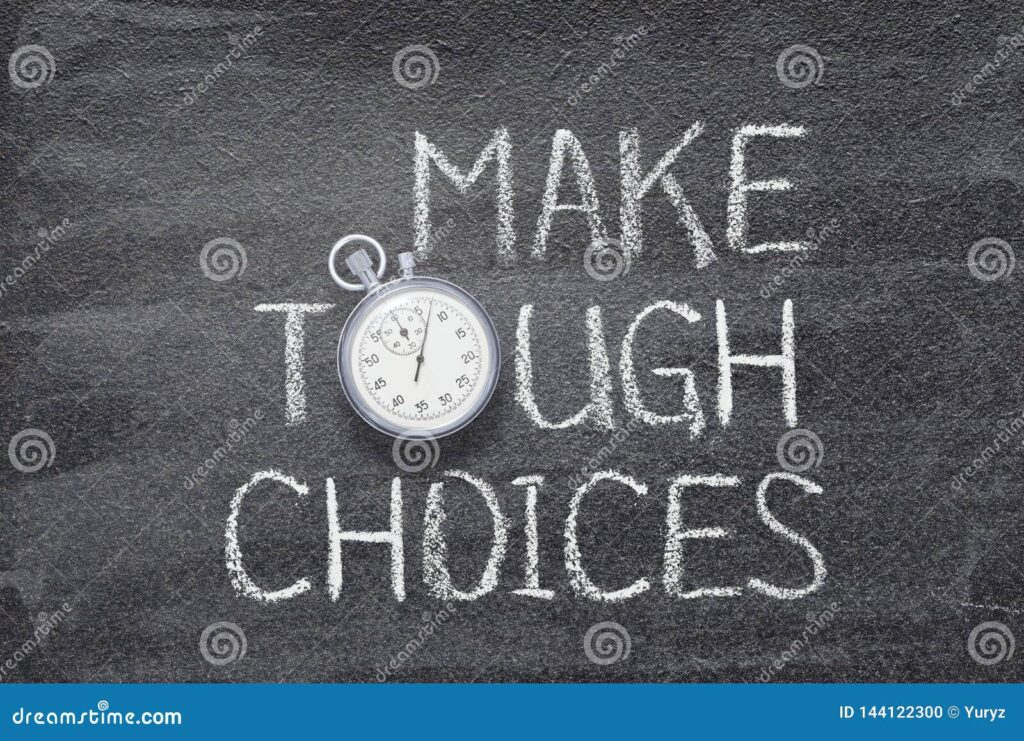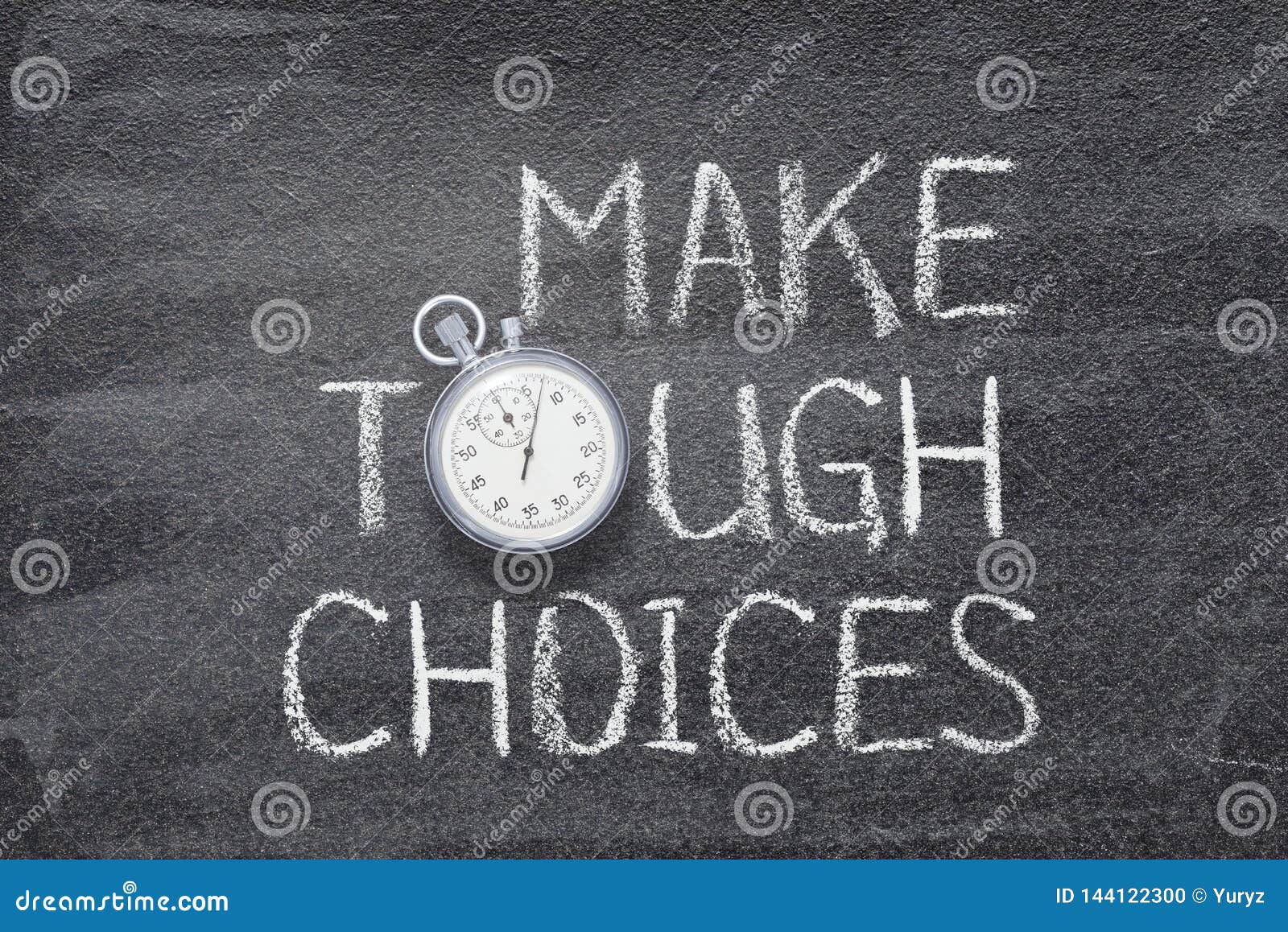
Navigating Life’s Crossroads: Making Tough Choices with Confidence
Life is a series of decisions, but some stand out as particularly challenging. These tough choices often involve high stakes, conflicting values, and uncertain outcomes. Whether it’s a career change, a relationship decision, a financial investment, or a moral dilemma, learning how to navigate these crossroads with confidence is essential for personal and professional growth. Understanding the anatomy of a tough choice, exploring different decision-making frameworks, and developing strategies for mitigating regret are crucial skills in today’s complex world. This article aims to provide a comprehensive guide to making tough choices, empowering you to approach these pivotal moments with clarity and conviction.
Understanding the Nature of Tough Choices
What makes a choice truly ‘tough‘? It’s not just about the difficulty of execution, but the inherent conflict within the decision itself. Tough choices frequently present themselves when there’s no clear ‘right’ answer, and each option carries significant advantages and disadvantages. These choices often force us to confront our values, priorities, and fears. For example, deciding whether to accept a higher-paying job that requires relocating away from family presents a conflict between financial stability and personal relationships. Recognizing the factors that contribute to the difficulty of a decision is the first step towards making a more informed and confident choice. The weight of these tough choices can be overwhelming.
Identifying the Core Conflict
At the heart of every tough choice lies a fundamental conflict. This conflict can be between short-term versus long-term goals, personal desires versus societal expectations, or ethical principles versus practical considerations. Identifying the core conflict allows you to clarify what’s truly at stake and to evaluate each option based on its impact on your most important values. For instance, choosing between pursuing a passion project and maintaining a stable job involves a conflict between creative fulfillment and financial security. Understanding this core conflict allows you to weigh the pros and cons of each option more effectively. Facing these tough choices head-on is crucial.
The Role of Uncertainty
Uncertainty is a constant companion when facing tough choices. We rarely have complete information about the potential outcomes of our decisions, and unforeseen circumstances can always arise. This uncertainty can lead to anxiety, procrastination, and ultimately, poor decision-making. Embracing uncertainty involves accepting that you cannot control all the variables and focusing on what you *can* control: your values, your analysis, and your commitment to making the best decision possible with the information available. Learning to tolerate ambiguity is a key skill for navigating life’s complexities. When faced with tough choices, remember that perfect information is rarely available.
Decision-Making Frameworks for Tough Choices
Several decision-making frameworks can help you approach tough choices with greater clarity and structure. These frameworks provide a systematic way to evaluate options, consider potential outcomes, and align your decisions with your values.
The Cost-Benefit Analysis
The cost-benefit analysis is a classic decision-making tool that involves systematically weighing the advantages and disadvantages of each option. This framework encourages you to quantify the potential benefits and costs, both tangible and intangible, associated with each choice. For example, when deciding whether to invest in a new business venture, you would consider the potential financial returns, the risks involved, the time commitment required, and the impact on your personal life. By assigning values to each factor, you can create a comparative analysis that helps you identify the option with the greatest net benefit. Tough choices often require a thorough cost-benefit analysis.
The Values-Based Decision Matrix
The values-based decision matrix focuses on aligning your choices with your core values. This framework involves identifying your most important values (e.g., integrity, creativity, security, family) and evaluating each option based on how well it supports those values. For instance, if integrity is a core value, you would carefully consider the ethical implications of each choice and prioritize the option that aligns with your moral compass. This framework helps you make decisions that feel authentic and aligned with your sense of self. [See also: Ethical Decision Making in Business] Many tough choices involve ethical considerations.
The Eisenhower Matrix (Urgent/Important)
The Eisenhower Matrix, also known as the Urgent/Important Matrix, helps prioritize tasks and decisions based on their urgency and importance. This framework involves categorizing tasks into four quadrants: Urgent and Important (do immediately), Important but Not Urgent (schedule for later), Urgent but Not Important (delegate), and Neither Urgent nor Important (eliminate). This framework is particularly useful for managing competing priorities and focusing on the most impactful decisions. When facing a tough choice, determine its urgency and importance to prioritize your decision-making process. This allows you to make a decision sooner rather than later.
Strategies for Mitigating Regret
One of the biggest fears associated with tough choices is the potential for regret. However, regret is not inevitable. By adopting proactive strategies, you can minimize the likelihood of regret and learn to live with your decisions, even if they don’t turn out as planned.
Gathering Information and Seeking Advice
One of the most effective ways to mitigate regret is to gather as much information as possible before making a decision. This involves researching the potential outcomes of each option, consulting with trusted advisors, and seeking diverse perspectives. The more informed you are, the more confident you will be in your decision and the less likely you are to second-guess yourself later. However, it’s important to avoid analysis paralysis and to recognize when you have enough information to make a reasonable decision. When faced with tough choices, seek advice from trusted sources.
Accepting Imperfection and Embracing Uncertainty
As mentioned earlier, uncertainty is an inherent part of life. Accepting that you cannot control all the variables and that mistakes are inevitable is crucial for minimizing regret. Instead of striving for perfection, focus on making the best decision possible with the information available and learning from any mistakes that occur. Embracing uncertainty allows you to approach tough choices with greater flexibility and resilience. Remember that not all tough choices will have perfect outcomes.
Focusing on the Process, Not Just the Outcome
Often, we judge our decisions based solely on their outcomes. However, focusing solely on the outcome can lead to unnecessary regret, especially if things don’t go as planned. Instead, focus on the decision-making process itself. Did you gather sufficient information? Did you consider your values? Did you seek advice from trusted sources? If you can honestly say that you made the best decision possible under the circumstances, then you have less reason to regret the outcome, even if it’s not ideal. The process of making tough choices is just as important as the result.
Practicing Self-Compassion
Finally, practicing self-compassion is essential for mitigating regret. Be kind to yourself and acknowledge that everyone makes mistakes. Instead of dwelling on what you could have done differently, focus on learning from the experience and moving forward with greater wisdom and resilience. Self-compassion allows you to forgive yourself for any perceived failures and to embrace the journey of life with all its ups and downs. Learning to live with these tough choices requires self-compassion.
Examples of Tough Choices in Different Areas of Life
Tough choices manifest in various aspects of life. Let’s explore some common examples.
Career Choices
Deciding whether to switch careers, accept a promotion with increased responsibilities, or start your own business are all tough choices. These decisions involve weighing factors such as financial stability, job satisfaction, work-life balance, and personal growth. [See also: Career Transition Strategies] A career change is often a tough choice.
Relationship Choices
Deciding whether to stay in a relationship, end a relationship, or commit to marriage are among the most emotionally charged tough choices. These decisions involve considering factors such as love, compatibility, communication, and shared values. Ending a relationship is a particularly tough choice.
Financial Choices
Deciding whether to invest in a risky venture, buy a house, or take on debt are all significant financial decisions. These choices involve weighing factors such as potential returns, risk tolerance, financial security, and long-term goals. Making sound financial decisions when presented with tough choices is critical.
Ethical Choices
Facing moral dilemmas that challenge your values and principles can be incredibly difficult. These tough choices often involve navigating conflicting obligations, considering the impact on others, and upholding your integrity. Ethical considerations are paramount when faced with tough choices.
Conclusion
Navigating life’s crossroads with confidence requires a combination of analytical skills, emotional intelligence, and a commitment to aligning your decisions with your values. By understanding the nature of tough choices, adopting effective decision-making frameworks, and developing strategies for mitigating regret, you can empower yourself to approach these pivotal moments with clarity and conviction. Remember that making the best decision possible under the circumstances is the ultimate goal, and that learning from your experiences is the key to personal and professional growth. When you’re faced with tough choices, take a deep breath, analyze the situation, and trust your judgment.

